- Home
- Ko-pick: Korean Queer Cinema
- by KoBiz / Nov 08, 2024
Over recent years there has been an increasing number of films dealing with the LGBTQIA+ community, especially in the independent industry with titles such as Han Ji-won’s animation The Summer (2023), Byun Gyuri’s documentary Coming to You (2021) and Han Jay’s Take Me Home (2020). This year the commercial industry also saw E Oni’s Love in the Big City (2024) that is significant for its portrayal of a gay man living in Seoul. The film based on Park Sang-young’s novel of the same name was also adapted into a limited series that dropped on the local streaming platform in October.
This is perhaps reflective of changing attitudes towards the LGBTQIA+ community but as these films highlight significant challenges remain. Having queer characters in mainstream Korean content is still uncommon. The independent industry, however, while also tackling other taboo themes, has been eager to focus more on queer characters.
The first Korean film to deal with difficulties facing a gay man was Park Jae-ho’s independent title Broken Branches (1996) that screened at the Busan International Film Festival. Since then, there have been several films delving into LGBTQIA+ themes, which also includes a growing – if somewhat small number – of commercial films including Kim Tae-yong and Min Kyu-dong’s Memento Mori (1999), Kim Dae-seung’s Bungee Jumping of Their Own (2001). These films came as the industry was undergoing transformation allowing filmmakers and producers to experiment with genres and themes.
Lee Hae-young and Lee Hae-jun’s Like a Virgin (2005) was notable for its leading transgender character, while Lee Joon-ik’s The King and the Clown (2005), Leesong Hee-il’s No Regret (2006) and Yoo Ha’s A Frozen Flower (2008) explore the themes of homosexuality. In the 2010s, the most significant features are titles made outside the studios system as the independent industry continued to grow giving filmmakers an opportunity to tackle themes that are less prevalent in commercial cinema. This includes Lee Hyun-joo’s Our Love Story (2016) and Lim Dae-hyung’s Moonlit Winter (2019).
This week, we will delve into some of these films that feature queer characters beginning with Road Movie (2002) before profiling Like a Virgin (2006), Night Flight (2014), Our Love Story (2016), Moonlit Winter (2019), Take Me Home (2020), Coming to You (2021) and The Summer (2023).
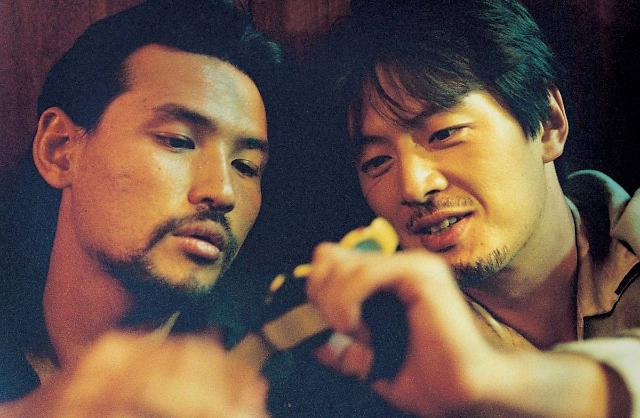
Helmed by Kim In-sik, it stars Hwang Jung-min as a mountain climber called Dae-shik who is homeless in Seoul – he is sleeping in one of the city’s major terminals, Seoul Station. He inadvertently saves the live of a failed stockbroker, Seog-won (Jung Chan) and they form a friendship that leads them to Seog-won’s hometown. On the way, they also meet the prostitute Il-joo (Seo Rin).
Trips to hometowns have appeared in Korean films over the decades in features such as Lee Man-hee’s A Road to Sampo (1975) and Bae Chang-ho’s Whale Hunting (1984). Interestingly these films also feature two male characters and one female character but what makes Road Movie stand out is for how we learn more about the gay protagonist and how he is unable to express himself as queer in a patriarchal and conservative society.
Hwang Jung-min who would become one of Korean cinema’s most prominent stars featuring in films including A Good Lawyer’s Wife (2003), New World (2013), Veteran (2015) and 12:12 The Day (2023) won Best New Actor at the Blue Dragon Awards for his role in Road Movie. The film would also screen at multiple festivals after screening at the London Film Festival in 2002.
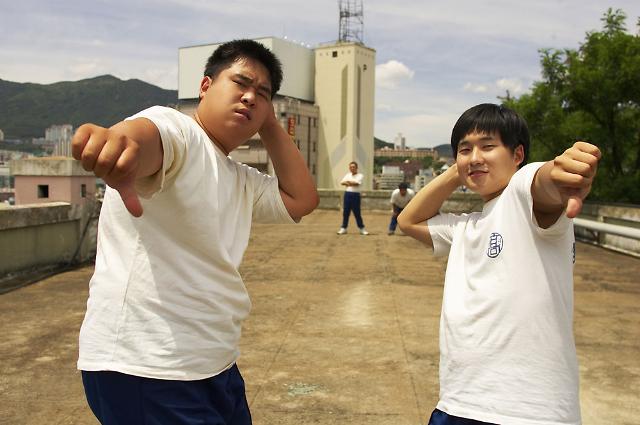
Directed and written by Lee Hae-jun and Lee Hae-young, it follows a high school student Dong-ku (Ryu Deok-hwan) who is seeking sex reassignment surgery and takes up Korean wrestling (Ssireum) in order to save money for the procedure. Baek Yoon-sik plays the coach while Kim Yoon-seok is Dong-ku’s alcoholic father.
Released at the end of the summer in 2006, the film is notable for featuring a transgender leading character making it one of the first feature films to do so. Other films later followed including Jang Jin’s neo-noir action thriller Man on High Heels (2014) and the independent Korean films Jane (2016) Peafowl (2022). These titles are less humorous compared to Like a Virgin, which is more of a comedy (like many films of this era) yet also remains serious in its tone as it tackles themes of gender and masculinity.
The film won three Blue Dragon Awards: Best New Director and Best Screenplay for Lee Hae-jun and Lee Hae-young along with Best New Actor for Ryu Deok-hwan. It also screened at a festivals in Asia, North America and Europe including Berlin, Hong Kong and Fantasia underlining its critical success.
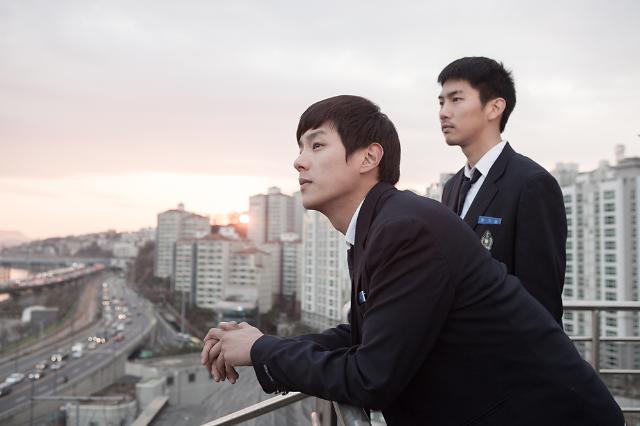
Also resonating on the film festival circuit was Night Flight (2016) that premiered at the Berlin International Film Festival before screening at the Edinburgh and SITGES film festivals. It was released theatrically in Korea in August 2014.
It follows three teenage boys who used to be very close but once they enter high school their relationship is fractured when Gi-woong (Lee Jae-joon) enters a gang and it is revealed by Gi-taek (Choi Joon-ha) that Yong-joo (Kwak Si-yang) is gay and has long had feelings towards Go-woong.
As Night Flight further demonstrates, Korean films have often dealt with issues facing society through the theme of friendship illustrated in films such as Take Care of My Cat (2001) and Bleak Night (2010) and how societal pressures and conflicts can affect relationships with those around them.
Directed by Leesong Hee-il, he is one of the leading voices in Korean queer cinema who has written and directed several features dealing with gay characters including his lauded and significant feature debut No Regret (2006) and White Night (2012).
Premiering at the Jeonju International Film Festival in 2016, Our Love Story directed by Lee Hyun-ju centers on a fine arts student (Lee Sang-hee) who meets and develops feelings for an extroverted bartender (Ryu Sun-young). While she had dated men before she finds herself falling for a woman.
In what is a relatively simply plot, it’s a carefully crafted drama that focuses on a love story between two woman and the struggles that this brings in a society where homophobia remains very real. It is reliant on the strong performances by the leads with Lee Sang-hee winning several New Actress Awards.
The title was produced by the Korean Academy of Film Arts (KAFA) and its critical success followed on from Ahn Gooc-jin’s Alice in Earnestland (2015) that also screened at the Jeonju International Film Festival a year earlier and went on to accrue several award nominations for its director and leading actress (Lee Jung-hyun).
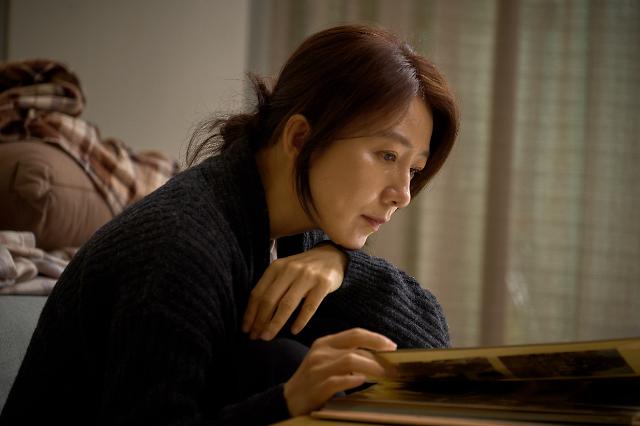
Lim Dae-hyung attracted notice for his enchanting feature debut Merry Christmas Mr. Mo (2016) and successfully lived up to expectations with his subsequent feature Moonlit Winter (2019) that closed the Busan International Film Festival in 2019.
The film, which is largely set in Hokkaido, Japan sees the female protagonist played by Kim Hee-ae who makes a trip with her daughter (Kim So-hye) to the town of Otaru after the high school student discovers a mysterious letter to her mother who has recently divorced.
In what was an unhappy marriage, the divorcee was forced to conform to social norms and deny her sexuality after developing feelings for Jun (Yuko Nakamura) in high school. Bringing together beautiful visuals and layered performances, it’s an absorbing film that also performed well at the box office selling 122,243 tickets which for an independent film is significant, not least given its LGBTQIA+ themes. Lim also won Best Director and Screenplay at the Blue Dragon Awards in 2020.
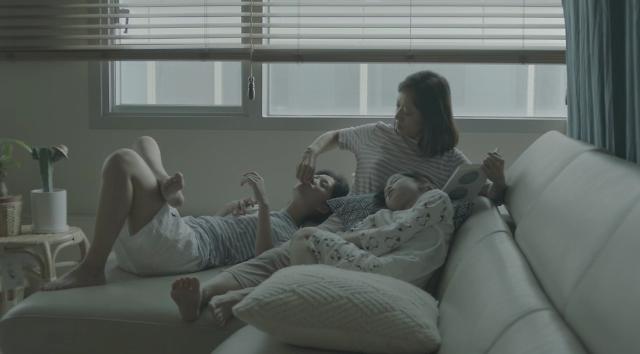
Having premiered at the Jeonju International Film Festival in the Korean Competition, Han Jay’s feature debut Take Me Home also went on to screen at the Women’s Film Festival in Gwangju and Seoul International Women’s Film Festival in 2020.
Its story is a bit different compared to these other narrative films profiled here in that it follows a lesbian couple, Eun-su (Woo Mi-hwa) and Ye-won (Lee Yeon) who raise Eun-su’s niece (Kim Bo-min) after her mother (Eun-su’s sister) is killed in an accident. The girl is paralyzed as a result of the accident. The film explores the difficulties of raising a child by women in a same-sex relationship as they seek the same rights as a heterosexual couple.
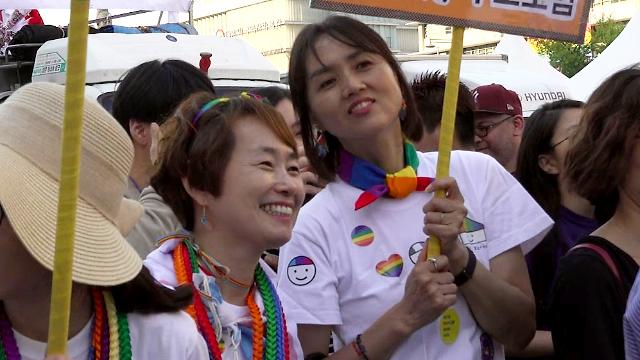
What many of these titles share in common is how characters from the LGBTQIA+ community in Korea continue to face difficulties of acceptance and discrimination. While Byun Gyu-ri’s documentary also deals with this, it is also unique for how it turns its focus on two mothers, Nabi and Vivian who are supportive of their children; Nabi’s is transgender while Vivian’s son is gay.
The film, which follows the subjects over several years sees how at first the mothers were reluctant to accept them as queer but over time they are not only supportive but also become activists in the community campaigning for equality. Although many of these titles depict a society that is conservative in its views on LGBTQIA+, this is a film that refreshingly finds some optimism and how people’s minds can change.
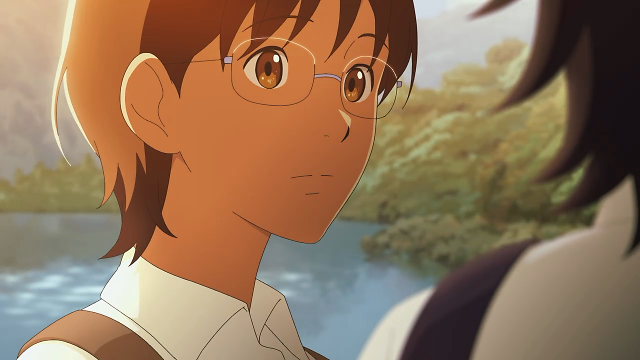
Han Ji-won’s The Summer is a 60-minute animation based on a story of the same name by Choi Eun-young. The film follows a student Lee-kyung (Yoon Ah-young) who befriends Soo-ee (Song Ha-rim), a soccer player, during the summer of their last year in high school. But after graduating from school and heading for Seoul with Lee-Kyung entering university, the pair who have different personalities begin to drift apart.
The queer romance was invited to the Seoul International Women’s Film Festival, Women’s Film Festival in Gwangju and also the London Korean Film Festival. Director Han Ji-won has a background in animation having helmed award-winning shorts including Kopi Luwak (2010) while she also worked as an animator on the film 26 Years (2012).
Written by Jason Bechervaise
Editted by Shim Eun-ha
- Any copying, republication or redistribution of KOFIC's content is prohibited without prior consent of KOFIC.















